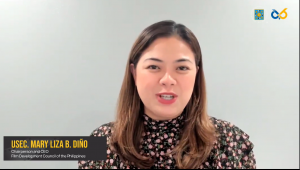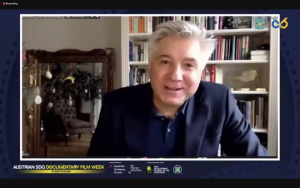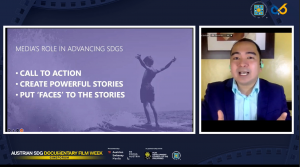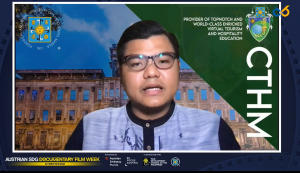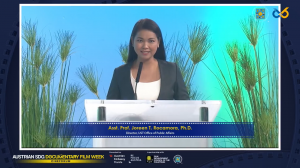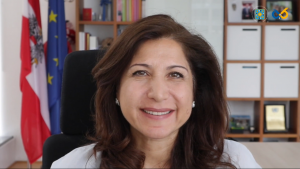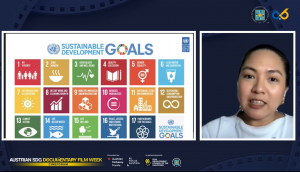The University of Santo Tomas, through the Office of Public Affairs joined the Austrian Embassy in Manila and the Film Development Council of the Philippines (FDCP) in organizing a Sustainable Development Goals (SDG) Film Festival and CineForum.
Six documentary films, namely, Die Dohnal (Johanna Dohnal – Visionary of Feminism) by Sabine Delflinger; Erde (Earth) by Nikolaus Geyrhalte; Guardians of the Earth by Filip Antoni Malinowski; The Green Lie by Werner Boote; Wood by Ebba Sinzinger, Michaela Kirst, and Monica Lazurean-Gorgan; and Zeit Für Utopien (Utopia Revisited) by Kurt Langbein, were made available publicly and for free on the FDCP website from March 27 to April 2, 2022, and on the last day, a CineForum with Mr. Werner Boote as the keynote speaker, was held virtually through Zoom. The discussion is still available for viewing on the official UST Facebook page.
Her Excellency Bita Rasoulian, in her welcome remarks, said, “It’s our hope that through this initiative we are able to highlight the role of film and media in implementing the SDGs and inspire you to use your talents and skills to achieve a more just, prosperous, and equitable society.”
OPA Director Asst. Prof. Joreen T. Rocamora, Ph.D., echoed the sentiment and shared that, “We are lucky to be able to watch six thought-provoking films that will inspire audiences to discuss the agenda for sustainable development and consider contemporary societal challenges. In their own unique ways, they simultaneously express the gravity of our man-made environmental and societal crises, but more importantly, they also highlight the hope, ingenuity, and tenacity of our human society that is highly capable of working for the common good.”
In his talk, Boote shared his journey as an environmental film maker and how his films Plastic Planet (2009), Population Boom (2013), and The Green Lie (2018) aided not only in awareness, but in generating discussions to gather possible solutions. In particular, The Green Lie, included in the Film Festival line up, tackles “greenwashing,” the unethical practice of portraying an organization, product, or service as eco-friendly purely as a sales strategy. The documentary showed how “green” or “environmentally friendly” company images are used to obscure continued resource destruction and pollution, and how conscious “eco-conscious” choices by individual consumers are not enough to combat corporate greed.
The more conversations happen about a societal issue like climate change, the more ideas can come up to make little changes, shared Boote. Solutions are not as clear or simple as just ceasing the sale and production of plastic, because many lifesaving or crucial products can only be made from the material. Instead, the world needs complex solutions where society joins together to actively do their part.
Boote emphasized, “Consumers need to think about our purchases, politicians need to come up with new regulations which can keep the environment [sustainable], and the industry needs to come up with alternatives to harmful materials and practices.”
United Nations Development Programme Communications Associate Charlene Balaan, one of the three panelists, focused on clarifying the concept of the 17 SDGs.
“To call development sustainable, it must improve the living conditions in the present without compromising the resources of future generations. We must understand that we are all connected together and that economic and social wellbeing cannot be improved through measures that destroy the environment,” said Balaan.
Another panelist was the College of Tourism and Hospitality Management academic staff Mr. Jame Monren T. Mercado, whose research expertise is sustainable tourism planning and development.
In Mercado’s talk, he shared that “The academe would do well on the importance of integrating the SDGs in the curriculum or pedagogies of our students, highlighting the importance of how we can teach our students on applying the SDGs within their respective programs or chosen field.”
Mercado also emphasized the need for significant collaboration of the academe with other industries, with the media, and the government in larger scale dissemination of information about the SDGs.
The third panelist, journalist and CNN correspondent Mr. Tristan Nodalo, highlighted the role of media in achieving the SDGs. Aside from promoting the SDGs, the media can reduce the spread of misinformation and disinformation; help in promoting the rule of law to ensure justice for all; aid in the fight against corruption by providing an avenue for the expression of citizens’ concerns; promote political participation; reinforce the importance of democracy, provide access to information and fundamental freedoms.
Almost 300 academic staff, students, and guests attended the CineForum. It was hosted by OPA Assistant to the Director for Public Affairs Ms. Michaella O. Lagniton, and the panel discussion and question-and-answer portion was moderated by the Assistant to the Director for Publication Ms. Katherine Patrice B. Sibug.



